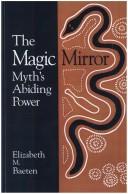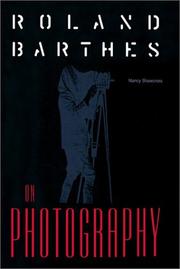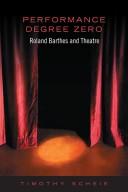| Listing 1 - 10 of 25 | << page >> |
Sort by
|
Book
ISBN: 1849647224 9781849647229 9781849647243 9781849647236 0745329578 9780745329574 0745329586 9780745329581 Year: 2012 Publisher: London : Pluto Press,
Abstract | Keywords | Export | Availability | Bookmark
 Loading...
Loading...Choose an application
- Reference Manager
- EndNote
- RefWorks (Direct export to RefWorks)
Roland Barthes remains one of the most influential cultural theorists of the postwar period and 'Image-Music-Text' collects his most influential essays. Ed White provides students with a clear guide to this essential but difficult text.
Culture --- Society. --- Philosophy. --- Barthes, Roland.

ISBN: 0585042624 9780585042626 079143091X 0791430928 0791495590 Year: 1996 Publisher: [Place of publication not identified] State University of New York Press
Abstract | Keywords | Export | Availability | Bookmark
 Loading...
Loading...Choose an application
- Reference Manager
- EndNote
- RefWorks (Direct export to RefWorks)
Barthes, Roland --- Myth --- Mythology, Comparative --- Religion --- Philosophy & Religion --- Demythologization --- God --- Gods --- Mythology --- History --- Barthes, Roland. --- Cassirer, Ernst, --- Eliade, Mircea, --- Hillman, James. --- Eliade, M. --- Myth.
Book
ISBN: 0820346594 9780820346595 0820311391 9780820311395 0820334936 Year: 1989 Publisher: Athens : University of Georgia Press,
Abstract | Keywords | Export | Availability | Bookmark
 Loading...
Loading...Choose an application
- Reference Manager
- EndNote
- RefWorks (Direct export to RefWorks)
Insisting that his world can best be understood in terms of the paradoxes he perceived in the very activity of writing, Lombardo similarly sees in Barthes the crucial ambiguity that determines the modern writer--an irresistible attraction for something new, different, breaking with the past, yet also an unavoidable scorn for the contemporary world.
Barthes, Roland. --- Philologists --- Philologians --- Scholars --- Linguists --- Barthes, Roland --- Barthes, R. --- Барт, Ролан --- Bart, Rolan --- Baruto, Roran --- בארת, רולאן --- بارت، رولان --- ロラン・バルト --- Luolan Bate --- 羅蘭・巴特
Book
ISBN: 1282040510 9786612040511 1847600727 9781847600721 9781282040519 6612040513 Year: 2008 Publisher: Tirril [England] : Humanities-Ebooks,
Abstract | Keywords | Export | Availability | Bookmark
 Loading...
Loading...Choose an application
- Reference Manager
- EndNote
- RefWorks (Direct export to RefWorks)
Barthes, Roland. --- Barthes, Roland --- Barthes, R. --- Барт, Ролан --- Bart, Rolan --- Baruto, Roran --- בארת, רולאן --- بارت، رولان --- ロラン・バルト --- Luolan Bate --- 羅蘭・巴特
Book
ISBN: 0231527209 Year: 2012 Publisher: New York : Columbia University Press,
Abstract | Keywords | Export | Availability | Bookmark
 Loading...
Loading...Choose an application
- Reference Manager
- EndNote
- RefWorks (Direct export to RefWorks)
Renowned philosopher and prominent French critic François Noudelmann engages the musicality of Jean-Paul Sartre, Friedrich Nietzsche, and Roland Barthes, all of whom were amateur piano players and acute lovers of the medium. Though piano playing was a crucial art for these thinkers, their musings on the subject are largely scant, implicit, or discordant with each philosopher's oeuvre. Noudelmann both recovers and integrates these perspectives, showing that the manner in which these philosophers played, the composers they adored, and the music they chose reveals uncommon insight into their thinking styles and patterns.Noudelmann positions the physical and theoretical practice of music as a dimension underpinning and resonating with Sartre's, Nietzsche's, and Barthes's unique philosophical outlook. By reading their thought against their music, he introduces new critical formulations and reorients their trajectories, adding invaluable richness to these philosophers' lived and embodied experiences. The result heightens the multiple registers of being and the relationship between philosophy and the senses that informed so much of their work. A careful reader of music, Noudelmann maintains an elegant command of the texts under his gaze and appreciates the discursive points of musical and philosophical scholarship they involve, especially with regard to recent research and cutting-edge critique.
Music and philosophy. --- Sartre, Jean-Paul, --- Nietzsche, Friedrich Wilhelm, --- Barthes, Roland --- Knowledge --- Knowledge --- Knowledge
Book
ISBN: 9780231527200 0231527209 9780231153942 0231153945 Year: 2012 Publisher: New York : Columbia University Press,
Abstract | Keywords | Export | Availability | Bookmark
 Loading...
Loading...Choose an application
- Reference Manager
- EndNote
- RefWorks (Direct export to RefWorks)
Renowned philosopher and prominent French critic François Noudelmann engages the musicality of Jean-Paul Sartre, Friedrich Nietzsche, and Roland Barthes, all of whom were amateur piano players and acute lovers of the medium. Though piano playing was a crucial art for these thinkers, their musings on the subject are largely scant, implicit, or discordant with each philosopher's oeuvre. Noudelmann both recovers and integrates these perspectives, showing that the manner in which these philosophers played, the composers they adored, and the music they chose reveals uncommon insight into their thinking styles and patterns.Noudelmann positions the physical and theoretical practice of music as a dimension underpinning and resonating with Sartre's, Nietzsche's, and Barthes's unique philosophical outlook. By reading their thought against their music, he introduces new critical formulations and reorients their trajectories, adding invaluable richness to these philosophers' lived and embodied experiences. The result heightens the multiple registers of being and the relationship between philosophy and the senses that informed so much of their work. A careful reader of music, Noudelmann maintains an elegant command of the texts under his gaze and appreciates the discursive points of musical and philosophical scholarship they involve, especially with regard to recent research and cutting-edge critique.
Music and philosophy. --- Sartre, Jean-Paul, --- Nietzsche, Friedrich Wilhelm, --- Barthes, Roland --- Knowledge

ISBN: 0813023386 9780813023380 0813014697 9780813014692 Year: 1997 Publisher: Gainesville, FL : University Press of Florida,
Abstract | Keywords | Export | Availability | Bookmark
 Loading...
Loading...Choose an application
- Reference Manager
- EndNote
- RefWorks (Direct export to RefWorks)
Photography --- Photographic criticism. --- Photographic criticism --- Visual Arts --- Art, Architecture & Applied Arts --- Photography criticism --- Criticism --- Philosophy. --- Philosophy --- Barthes, Roland. --- Barthes, Roland --- Barthes, R. --- Барт, Ролан --- Bart, Rolan --- Baruto, Roran --- בארת, רולאן --- بارت، رولان --- ロラン・バルト --- Luolan Bate --- 羅蘭・巴特
Book
ISBN: 0231545886 9780231545884 9780231179867 0231179863 Year: 2018 Publisher: New York, NY : Columbia University Press,
Abstract | Keywords | Export | Availability | Bookmark
 Loading...
Loading...Choose an application
- Reference Manager
- EndNote
- RefWorks (Direct export to RefWorks)
Album provides an unparalleled look into Roland Barthes's life of letters. It presents a selection of correspondence, from his adolescence in the 1930s through the height of his career and up to the last years of his life, covering such topics as friendships, intellectual adventures, politics, and aesthetics. It offers an intimate look at Barthes's thought processes and the everyday reflection behind the composition of his works, as well as a rich archive of epistolary friendships, spanning half a century, among the leading intellectuals of the day.Barthes was one of the great observers of language and culture, and Album shows him in his element, immersed in heady French intellectual culture and the daily struggles to maintain a writing life. Barthes's correspondents include Maurice Blanchot, Michel Butor, Jacques Derrida, Michel Foucault, Julia Kristeva, Claude Lévi-Strauss, Georges Perec, Raymond Queneau, Alain Robbe-Grillet, Marthe Robert, and Jean Starobinski, among others. The book also features documents, letters, and postcards reproduced in facsimile; unpublished material; and notes and transcripts from his seminars. The first English-language publication of Barthes's letters, Album is a comprehensive testimony to one of the most influential critics and philosophers of the twentieth century and the world of letters in which he lived and breathed.
Critics --- Literary critics --- Criticism --- Litterateurs --- Barthes, Roland --- Barthes, R. --- Барт, Ролан --- Bart, Rolan --- Baruto, Roran --- בארת, רולאן --- بارت، رولان --- ロラン・バルト --- Luolan Bate --- 羅蘭・巴特
Book
ISBN: 1474415547 1474415555 9781474415545 9781474415538 1474415539 9781474415552 9781474415552 Year: 2016 Publisher: Edinburgh, [Scotland] : Edinburgh University Press,
Abstract | Keywords | Export | Availability | Bookmark
 Loading...
Loading...Choose an application
- Reference Manager
- EndNote
- RefWorks (Direct export to RefWorks)
A new critical consideration of the writings and works of Roland Barthes and Victor BurginThe influence of Roland Barthes on Burgin’s work is well documented. Equally, Burgin’s prominence as an artist and theorist concerned with text and image offers a productive dialogue with Barthes’ work. Victor Burgin has long been considered both theorist and practitioner, while Barthes is more known as a theorist and writer. In bringing to the fore Barthes’s practice of painting and drawing, Barthes/Burgin prompts a new critical consideration of Barthes/Burgin, theory/practice, writing/making and criticality/visuality.Barthes/Burgin features two new interviews with Burgin, one concerned with his turn to new digital practices and the other a reflection on his reading of Roland Barthes. Also included are images and texts from the artists and an essay critically examining Barthes’ exercises in drawing and painting.This book accompanied an exhibition at the John Hansard Gallery (February to April 2016), bringing together recent projection works by Victor Burgin and a selection of drawings by Roland Barthes rarely seen outside of France. The exhibition played with Barthes’ use of the slash as established in semiology (and notably used in the title of Barthes’ key poststructuralist work S/Z).Key FeaturesPublished as the official catalogue of the exhibition of the same name that is being held at the John Hansard Gallery in Southampton, as well as a stand-alone art and philosophy bookOver 20 full-colour illustrations, including newly commissioned work by Victor Burgin and images of Barthes’ work on paperContains newly commissioned text by Victor Burgin and unpublished conversations with him on his recent projection works and their theoretical implications
Drawing --- Photography, Artistic --- Artistic photography --- Photography --- Photography, Pictorial --- Pictorial photography --- Art --- Drawings --- Sketching --- Graphic arts --- Illustration of books --- Manual training --- Aesthetics --- Burgin, Victor --- Barthes, Roland --- Barthes, Roland. --- Burgin, Victor. --- Dessin --- Photographie artistique --- Barthes, R. --- Барт, Ролан --- Bart, Rolan --- Baruto, Roran --- בארת, רולאן --- بارت، رولان --- ロラン・バルト --- Luolan Bate --- 羅蘭・巴特

ISBN: 9780802090713 0802090710 9780802093875 0802093876 1281991872 9786611991876 1442678356 9781442678354 9781281991874 6611991875 Year: 2006 Publisher: Toronto, [Ontario] ; Buffalo, [New York] ; London, [England] : University of Toronto Press,
Abstract | Keywords | Export | Availability | Bookmark
 Loading...
Loading...Choose an application
- Reference Manager
- EndNote
- RefWorks (Direct export to RefWorks)
Throughout his career, Roland Barthes (1915-1980) had a complex and often uneasy relationship with theatre and performance. In Performance Degree Zero, Timothy Scheie argues that Barthes's body of work must be considered a lifelong engagement with theatre. Exploring his changing critical methodologies, Scheie provides a new understanding of the rapid shifts in critical modes Barthes traverses, from a Sartrean Marxism in the 1950s, through semiology, to French post-structuralism and the mournful introspection of his later years. The theatrical figure illuminates Barthes's accounts of the sign, the text, the body, homosexuality, love, the voice, photography, and other important and contested terms of his thought. "Performance Degree Zero"offers the first comprehensive account of Barthes's lifelong engagement with theatre and performance.
theater --- Theatrical science --- Barthes, Roland --- Theater. --- Criticism and interpretation. --- Dramatics --- Histrionics --- Professional theater --- Stage --- Theatre --- Performing arts --- Acting --- Actors --- Barthes, R. --- Барт, Ролан --- Bart, Rolan --- Baruto, Roran --- בארת, רולאן --- بارت، رولان --- ロラン・バルト --- Luolan Bate --- 羅蘭・巴特
| Listing 1 - 10 of 25 | << page >> |
Sort by
|

 Search
Search Feedback
Feedback About UniCat
About UniCat  Help
Help News
News